



An Interview with Heath Bunting – Part 1
I first met Heath when I moved to Bristol (UK) in 1988. It felt important, even profound. Not in a ‘jump in a bed’ kind of way. Yet our meeting did seem life changing somehow, to the both us. We hit it off and we collided – as equals – our collisions resonated, it shook our imaginations. From then on our paths, our lives connected and clashed regardless. We regularly challenged each other through constant, critical duels of dialogue; about activism, art, technology and ideas surrounding different life approaches and philosophies. From 1988 – 1994 (just before the Internet had properly arrived), in Bristol and London we collaborated on various projects such as pirate radio, street art and the cybercafe BBS – Bulletin Board System. We then went our separate ways exploring our own concerns more deeply, but continued to meet every now and then. Us both meeting in Bristol changed both of our worlds, it built the grounding of where we are now.
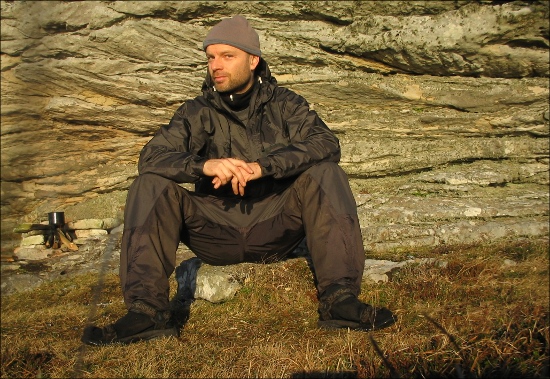
Heath founded the Irational.org collective in 1995, a loose grouping of six international net and media artists who came together around the server irational.org. The collective included Daniel Garcia Andujar / Technologies to the People (E), Rachel Baker (GB), Kayle Brandon (GB), Heath Bunting (GB), Minerva Cuevas / Mejor Vida Corporation (MEX) and Marcus Valentine (GB).
Heath Bunting’s work manifests a dry sense of humour, a minimal-raw aesthetic and a hyper-awareness of his own artistic persona and agency whilst engaging with complex political systems, institutions and contexts. Crediting himself as co-founder of both net.art and sport-art movements, he is banned for life from entering the USA for his anti GM work, such as the SuperWeed Kit 1.0 – “a lowtech DIY kit capable of producing a genetically mutant superweed, designed to attack corporate monoculture”. Bunting’s work regularly highlights issues around infringements on privacy or restriction of individual freedom, as well as issues around the mutation of identity; our values and corporate ownership of our cultural/national ‘ID’s’, our DNA and Bio-technologies “He blurs the boundaries between art, everyday life, with an approach that is reminiscent of Allan Kaprow but privileging an activist agenda.”[1]
In this two part interview we will discuss his current work within two distinctive areas of digital culture and sport-art starting with The Status Project, which studies the construction of our ‘official identities’ and creates what Bunting describes as “…an expert system for identity mutation”. His research explores how information supplied by the public in their interaction with organisations and institutions is logged. The project draws on his direct encounters with specific database collection processes and the information he was obliged to supply in his life as a public citizen, in order to access specific services; also on data collected from the Internet and from information found on governmental databases. This data is then used to map and illustrate how we behave, relate, choose things, travel and move around in social spaces. The project surveys individuals on a local, national and international level producing maps of influence and personal portraits for both comprehension and social mobility.
Marc Garrett: For many years now, your work has explored the concept of identity, investigating the various issues challenging us in a networked age. The combination of your hacktivist, artistic approach and conceptual processes have brought about a project which I consider is one of the most comprehensive, contemporary art projects of our age. The Status Project, deals with issues around personal identity head-on.
Why did you decide to embark on such a complex project?
Heath Bunting:
Three reasons
1. the network hacker
the network hacker fantasises about unlimited access to all systems made available through possession of treasure maps, keys and navigation skills
2. the Buddhist
the Buddhist intends to destroy the self and become only the summation of environmental factors plus find enlightenment in even the most banal bureaucracy
3. the computer scientist
the computer scientist aims to find comfort and hidden meaning in complex data
I am all three and am attempting to combine the obsessions of each into one project.
So far I have
Created a sketch database of the UK system with over 8000 entries
Created over 50 maps of sub-sections of the system to aid sense of place and potential for social mobility
Created system portraits of existing persons
Created software to generate new identities lawfully (off the shelf persons) and sold these identities
I am currently adding more data to the database. Which is split between the human being (flesh), the natural person (strawman) and the artificial person (corporation). Remaking maps using upgraded spider software, researching how to convert my identity generating software into a bot recognised under UK law as a person; and hence covered by the human rights act i.e. right to life and liberty; freedom of expression; peaceful enjoyment of property. I am very close to achieving this.
Did you know that 75% of the human rights act applies to corporations as well as individuals? If you were afraid of corporations in the 90’s and noughties then be very afraid of the automated voices that speak to you on stations or programs that transact currency exchanges, as they will soon be your legal equals as with all Hollywood propaganda, the reverse is true. The human beings will be the clumsy, half wit robot like creatures serving the new immortal ethereal citizens. If you think I am mad or joking, check back in 10 years time.
MG: Way back in 1995, there were already various groups and individuals (including yourself) who were critiquing human relationships whilst exploiting networked technology. Creative people who were not only hacking technology but also hacking into and around everyday life, expanding their skills by changing the materiality, the physical and immaterial through their practice. It was Critical Art Ensemble (CAE) who in 1995 said “Each one of us has files that rest at the state’s fingertips. Education files, medical files, employment files, financial files, communication files, travel files, and for some, criminal files. Each strand in the trajectory of each person’s life is recorded and maintained. The total collection of records on an individual is his or her data body – a state-and-corporate-controlled doppelganger. What is most unfortunate about this development is that the data body not only claims to have ontological privilege, but actually has it. What your data body says about you is more real than what you say about yourself. The data body is the body by which you are judged in society, and the body which dictates your status in the world. What we are witnessing at this point in time is the triumph of representation over being. The electronic file has conquered self-aware consciousness.”[2]
15 years later, we are dealing with an unstoppable flow of meta-networks, creeping into every area of our livng environments. We have mutated, become part of the larger data-sphere, it’s all around us. As you describe, it seems that we are mutating into fleshy ingredients, nourishing a technologically determined world.
HB: Data body is quite a good way to think about it. I consider each human being to possess one or more natural person(s) and each natural person to control or possess none, one or more artificial person(s) (i.e. corporation). The combined total of natural and artificial persons possessed or controlled by a human being can be thought of as their databody. As human beings, we have quite a lot of control over our persons (natural and artificial). The problem is that we either don’t realise this or it takes the time to manage them. It’s possible to obtain a corporation for less than the price of a train ticket between Bristol and London. Why do so many people live without one? Could anti corporate propaganda have something to do with this ?
“What is most unfortunate about this development is that the data body not only claims to have ontological privilege, but actually has it. What your data body says about you is more real than what you say about yourself.”(CAE).[2]
Only if you remain a passive user of it. The natural person is only linked to the human being through such fine devices as a signature, which we decide to give or withhold, most human being’s natural person is actually owned by the government and borrowed back by the human being. This does not have to be the case as we can create and use our own persons.
“The data body is the body by which you are judged in society, and the body which dictates your status in the world. What we are witnessing at this point in time is the triumph of representation over being. The electronic file has conquered self-aware consciousness.”(CAE).[2]
I would say laziness has triumphed over mindfulness. All information about the functioning of natural persons is easily available, all persons have the same rights unless they choose not to claim them. Instead, people choose to get lost in their own selves and dreams, indulged by those that seek to profit from their labour.
Technology is becoming more advanced and the administration of this technology is becoming more sophisticated and soon, every car in the street will be considered and treated as persons, with human rights. This is not a conspiracy to enslave human beings, it is a result of having to develop usable administration systems for complex relationships. Slaves were not liberated because their owners felt sorry for them, slaves were given more rights as a way to manage them more productively in a more technologically advanced society.
MG: Getting back to the part of your project which incorporates a complex process of compiling and creating ‘off the shelf persons’, as you put it. Are you using some of the collected data as a resource to form these new identities, or is it a set of ‘hybrid’ identities?
HB: Please expand this question further…
MG: Near the beginning of the interview, you mention that you “Created software to generate new identities lawfully (off the shelf persons) and sold these identities.” I am asking whether most of these ‘new identities’ that you have formed and sold are, a mixture of different bits of information. Like data-versions of body parts from a machine or vehicle, reused, recycled to recreate, make new hybrid identities?
HB: The identities I can create are all new and legal, they are a portfolio of new unique legal relationships created with existing artificial persons. For example, registering with Tesco Clubcard either creates or consolidates the new natural person http://status.irational.org/identity_for_sale – for a new natural person to be credible, it must be coherent and rational. This is achieved simply by following the rules of the system, the more interrelating links with other persons, the more real the new person becomes.
Off the shelf natural person.
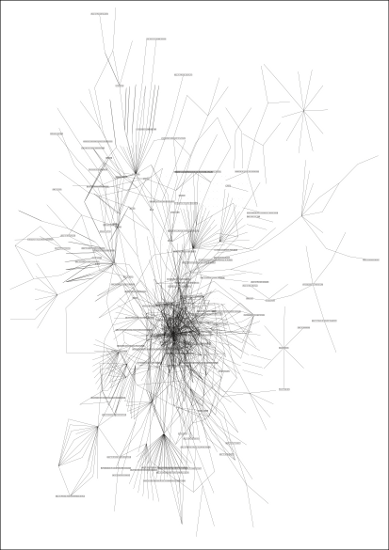
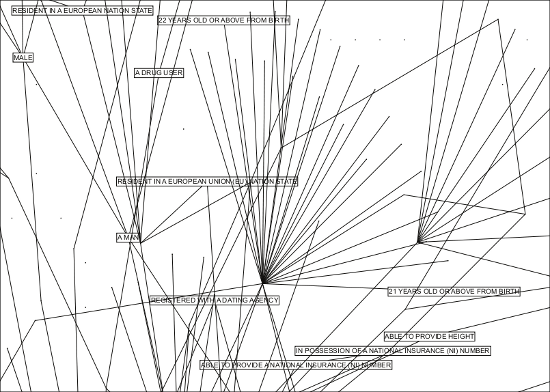
Comes with supporting physical items:
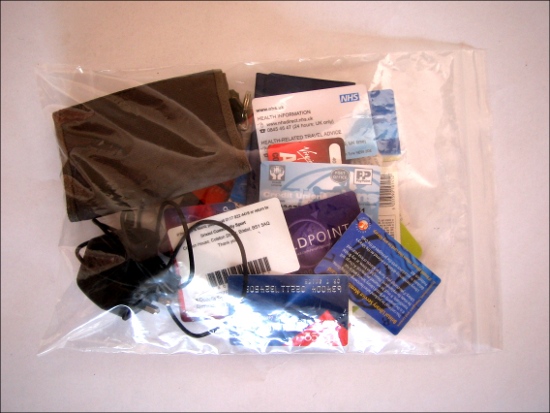
personal business cards, boots advantage card, marriott rewards card, cube cinema membership card, baa world points card, tesco clubcard, vbo membership card, WHSmith clubcard, silverscreen card, airmiles card, somerfield loyalty card, post office saving stamps collector card, virgin addict card, subway sub club card, dashi loyalty card, t-mobile top up card, european health insurance card, waterstone’s card, 20th century flicks card, bristol library card, co-operative membership card, nectar card, oyster card, bristol ferry boat company commuter card, love your body body shop card, co-operative dividend card, bristol credit union card, choices video library card, national rail photocard, bristol credit union account, bristol community sports card, star and garter public house membership card, first class stamp, nhs donor card, winning lottery ticket (2 GBP), t mobile pay as you go mobile and charger…
Upgradable to both corporate and governmental levels.
(500.00 GBP) – SOLD
MG: I can see on the web site, in the section The Status Project – Potentials that there are various ready-mades, ‘Off the shelf natural person – identity kits’. Am I right in presuming that there are individuals out there who have bought and used these kits?
HB: These are mostly existing persons, only one of them was synthetic. I will be setting up a small business soon though to manufacture and sell natural person.
MG: On exploring deeper into the Status Project data-base, there is link to a file called ‘In receipt of income based job seeker’s allowance’. This information is taken from ‘Jobcentre plus’, a UK government run organisation and on-line facility, inviting visitors to search for jobs, training, careers, childcare or voluntary work. How important was this source in compiling data for your database of individuals?
HB: This is only one record of over 8000 in the database, each record refers to one or more other record(s) in the database.
MG: What projects relate to/have influence on The Status Project in some way, and what makes them work?
HB: They Rule[3] – It allows users to browse through these interlocking directories and run searches on the boards and companies. A user can save a map of connections complete with their annotations and email links to these maps to others. They Rule is a starting point for research about these powerful individuals and corporations. A glimpse of some of the relationships of the US ruling class. It takes as its focus the boards of some of the most powerful U.S. companies, which share many of the same directors. Some individuals sit on 5, 6 or 7 of the top 500 companies.
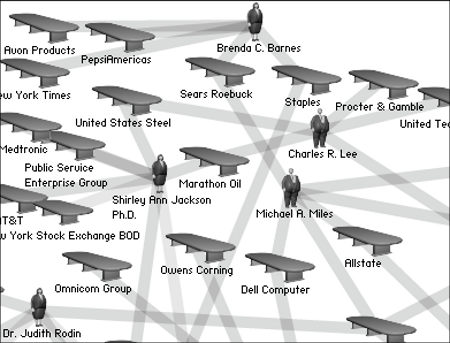
“Go to www.theyrule.net. A white page appears with a deliberately shadowy image of a boardroom table and chairs. Sentences materialize: “They sit on the boards of the largest companies in America.” “Many sit on government committees.” “They make decisions that affect our lives.” Finally, “They rule.” The site allows visitors to trace the connections between individuals who serve on the boards of top corporations, universities, think thanks, foundations and other elite institutions. Created by the presumably pseudonymous Josh On, “They Rule” can be dismissed as classic conspiracy theory. Or it can be viewed, along with David Rothkopf’s Superclass, as a map of how the world really works.”[4]
Bureau d’etudes – distribution.
http://bureaudetudes.org/
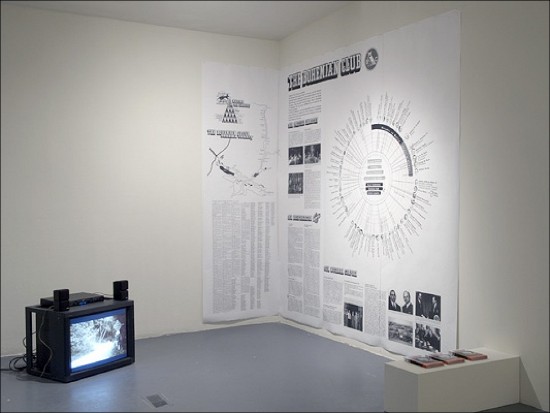
The Paris-based conceptual group, Bureau d’etudes, works intensively in two dimensions. In 2003 for an exhibition called ‘Planet of the Apes’ they created integrated wall charts of the ownership ties between transnational organizations, a synoptic view of the world monetary game. Check the article ‘Cartography of Excess (Bureau Bureau d’etudes, Multiplicity)’ written on Mute by Brian Holmes in 2003.[5]
MG: The sources of data for the Status Project seem to vary in type. Where do you collect them from and how do you collect the different kinds of data?
HB: It ranges from material instruments such as application forms right through to constitutional law and then common sense .
MG: How do you propose the Status Project might be used as a system for ‘identity mutation’?
HB: I want to communicate the fact that people in the UK can create a new identity lawfully without consulting any authority. I intend to illustrate the precise codification of class in the UK system, and there are three clearly defined classes of identity in the UK: human being, person and corporate . I am looking at the borders between these classes and how they touch each other, this can be seen with my status maps. Also, I intend to create aged off-the-shelf persons for sale similar to off-the-shelf corporations.
Taken from the front page of the Status Project:
Lower class human beings possess one severly reduced natural person and no control of an artificial person.
Middle class human beings possess one natural person and perhaps control one artificial person.
Upper class human beings possess multiple natural persons and control numerous artificial persons with skillful separation and interplay.
End of Part 1.
————–